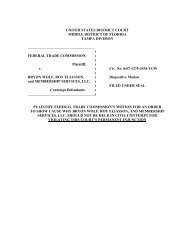HELO RCPT TO QUIT MAIL FROM DATA - Federal Trade Commission
HELO RCPT TO QUIT MAIL FROM DATA - Federal Trade Commission
HELO RCPT TO QUIT MAIL FROM DATA - Federal Trade Commission
Create successful ePaper yourself
Turn your PDF publications into a flip-book with our unique Google optimized e-Paper software.
<strong>Federal</strong> <strong>Trade</strong> <strong>Commission</strong><br />
ADV labeling violations. The Court entered a final judgment in that case and<br />
issued a permanent injunction ordering, among other relief, a $2 million civil<br />
penalty. 19 Although Missouri attempted to bring two enforcement actions under<br />
its general spam law – including violations of the labeling requirement – state<br />
authorities were unable to execute service on the defendants. 20 State attorney<br />
general offices emphasized the difficulty they experienced in seeking to enforce<br />
spam laws, chiefly because of the obstacles encountered in trying to identify and<br />
locate the spammers. 21<br />
3. Effectiveness of State Subject Line Labeling Requirements<br />
The CAN-SPAM Act’s findings specifically state:<br />
Many States have enacted legislation intended to regulate or reduce<br />
unsolicited commercial electronic mail, but these statutes impose<br />
different standards and requirements. As a result, they do not appear<br />
to have been successful in addressing the problems associated with<br />
unsolicited commercial electronic mail, in part because, since an<br />
electronic mail address does not specify a geographic location, it can be<br />
extremely difficult for law-abiding businesses to know with which of<br />
these disparate statutes they are required to comply. 22<br />
Although there do not appear to be any empirical studies or reports on the<br />
efficacy of the various state labeling requirements during the period when they<br />
were in effect, FTC staff found in its own April 2003 “False Claims in Spam”<br />
study that only two percent of email messages that the <strong>Commission</strong> reviewed<br />
contained an “ADV” label in their subject lines. 23 A representative from the<br />
Internet Commerce Coalition (“ICC”) similarly stated in an interview that a<br />
relatively small percentage of email was in compliance with state labeling<br />
19. People v. Willis, No. 1-02-CV811428 (Cal. Super. Ct. 2002).<br />
20. Missouri v. Nixon, No. 034-02424 (Mo. Cir. Ct. 2003); Missouri v. FunDetective.com, No. 034-<br />
02428 (Mo. Cir. Ct. 2003).<br />
21. States raising this concern include Illinois, Kansas, and Maine. See also FTC’s National Do Not<br />
Email Registry Report, at pp. 23-25, available at http://www.ftc.gov/reports/dneregistry/report.pdf.<br />
22. 15 U.S.C. § 7701(2)(a)(11) (2003).<br />
23. False Claims in Spam, 11. The <strong>Commission</strong> has posted the False Claims in Spam report online at<br />
http://www.ftc.gov/reports/spam/030429spamreport.pdf. At the time the <strong>Commission</strong>’s report came out, there<br />
were five states that had labeling laws in effect: Kansas, Minnesota, South Dakota, Utah, and Colorado.<br />
6

















